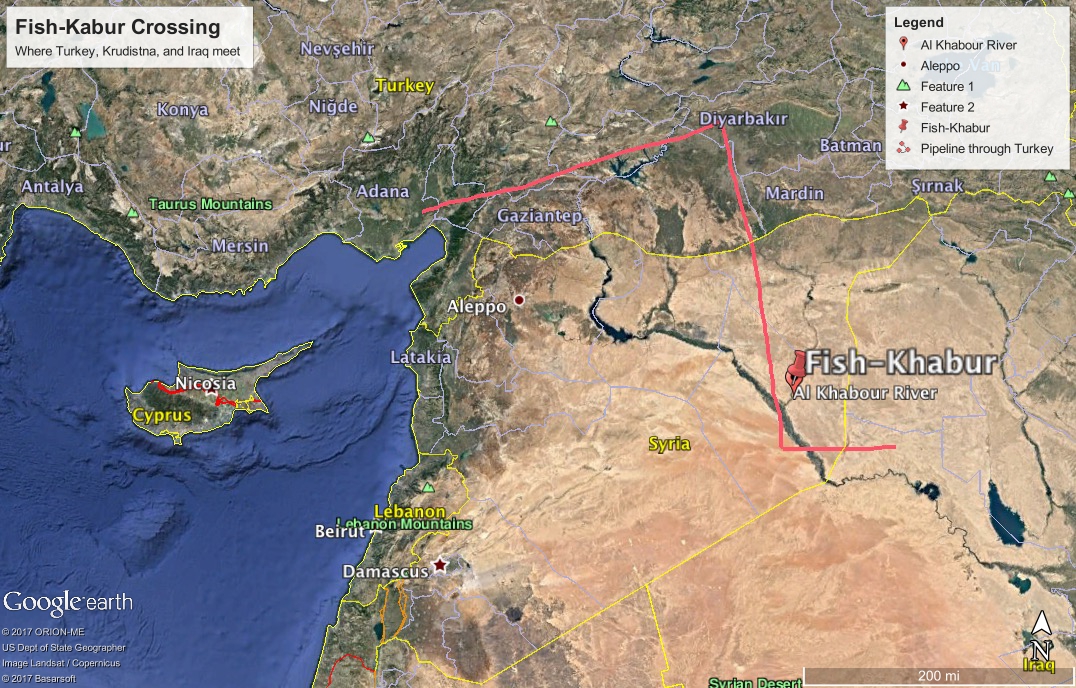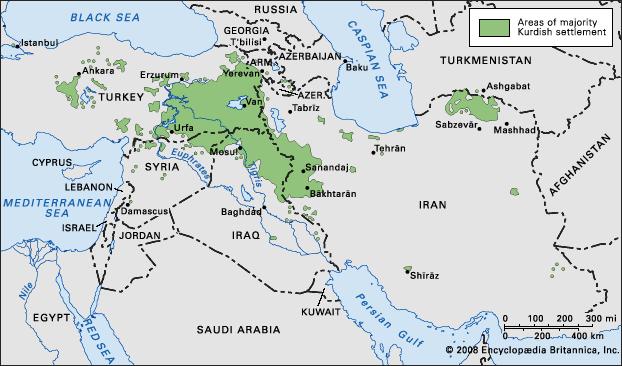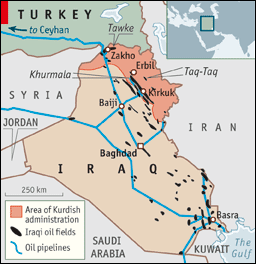
| ICE Case Studies
|
|
I.
Case Background |

A major issue in the Kurdish drive for independence from Iraq is control over oil resources in the north of the country. Major oil producing areas are in places under Kurdish control (and populated mostly by Kurds). Moreover, the Kurdish region is a major hub for oil from northern Iraq to Turkey and beyond. The status of the Kurds is a multi-country issue, with Iraq, Turkey, and Iran all opposed to a separate Kurdish state. In Iraq, the the role of the Kurds in the defeat of ISIS has emboldened independence aspirations and strengthened their bargaining position. In October 2017, Iraqi forces took Kirkuk and surrounding oil-producing areas from the Kurds. Oil has been always the key bargaining chip in Iraqi Kurds drive for a separate state.
In July, 2017 Iraqi and Kurdish forces captured Mosul from ISIS. The estimated numner of ISIS soldiers ranges from 2,000 to 10,000. Many ISIS soldiers fled to Raqqa at the start of the offensive. The city was massively bombarded and some believe the was a high civilian death toll.
Amid the complex mix of forces fighting in Iraq and Syria, Iraqi forces attack Kurdish peshmerga in October 2017. The goal was to re-take the city of Kirkuk from the Kurds and to seize the oilfields surrounding it. Control and allotment of oil resources and revenues has long been an item of contention between Iraq and the Kurdish areas of the country. The peshmerge did not give much of the fight and withdrew from the area.
The move though was in re-action to Kurdistan's vote for independence in a September 2017 referendum. The citizens overwhelmingly voted to withdraw from the country. The Iraqi government opposed the move. The move was opposed also by the United States and other supporters of Iraq. The Kurds though argue that their quest for an independent state has been stymied for over a century. The Kurds have enjoyed considerable autonomy from the central government sent to Gulf War of 1991. In response to Iraqi air attacks there following the end of the war, the U.S. and its allies imposed a no-fly zone.
Iraqi military forces and related paramilitaries allegedly attacked Fish-Khabur (or Faysh-Khabur), a place where oil pipelines from both Kurdish and Iraqi-government portions of northern Iraq cross into Turkey. All Kurdish oil exports go through here.
Unlike the oil regions around Kirkuk which has been traditionally seen as part of Iraq proper, Fish-Khabur was part of Kurdistan. Kurds largely withdrew from Kirkuk but fought back furiously at Fish-Khabur.
The Kurds export oil from their field at Taq Taq to the pipeline. It main pipeline originates in Kirkuk and travels west, ending at Ceyhan in Turkey. Fish-Kabhur is in Kurdistan but not populated by Kurds. It is mostly an Assyrian town. At last notice, Iraqi forces has taken the key point.
Figure 1: Kirkuk to Ceyhan Pipeline

Kurdistan comprises three provinces in northern Iraq, but stretches across several differing countries.

http://www.enterrasolutions.com/pipelines-oil-and-iraqs-future/
"Kurds", The Editors of Encyclopædia Britannica, 2017.
https://www.britannica.com/topic/Kurd#ref966597

The resource issue is two-fold. Not only is oil important as a resource and valued commodity, but the pipeline routes are also of enormous strategic importance. Kurdish areas produce half a million barrels of oil a day and could produce even more. As an independent Kurdistan would qualify for OPEC membership.
The noted referendum on independence spilled over into oil especially when the vote was extended to areas around Kirkuk, which was then controlled by the peshmerga. The Iraqi government saw this as not only a bid for independence but a land grab as well. The land was notable was its oil resources. (Rascouet and Murtaugh)

The oil production costs in Kurdistan are low compared to most other production sites, especially outside the Middle East. This, however, is balanced by the higher transportation costs to markets.
Kurdish oil accounts for about 12 percent of total Iraqi production. As a separate nation, Kurdish output would be about equal to that of Ecuador or Qatar.

Kurds in Iraq (and elsewhere) push for independence so the argument can be made that these are aspirational wars. That is to say, they are wars for independence, but it is hard to imagine any of them becoming a reality without parts of the other states cooperating. Moreover, there are serious internal conflicts within the various Kurdish communities.
The military and civilian deaths from the ISIS war will take years to calculate, as mass graves continue to be found.

Estimates put oil reserves in Kurdistan at 45 billion barrels.

Kurdish independence, even calls for it, set off regional crises. Turkey has been at war with Kurds off and on for many years. There are large Kurdish populations in Iran also. Kurds have been major players in the war against ISIS, garnering support from both the United States and Iran.
This situation remains a point of contention. Iraqi forces, in a show of strength and backed by Shiite militias, re-took the area. The situation remains quite fluid.

Oil, Nigeria, and Ogoni
Caspian Sea Oil
South Sudan and Oil
Go to Ice Search Engine and Scenario Builder
Alistair Jamieson, "ISIS Death Toll: 18,800 Killed in Iraq in 2 Years, U.N. Says". NBSC News
https://www.nbcnews.com/storyline/isis-terror/isis-death-toll-18-800-killed-iraq-2-years-u-n499426
Roger Gulu, "No Institutional Evolution for Kurdistan’s Economy", Middle East Research Institute, October 8, 2014
http://www.meri-k.org/publication/no-institutional-evolution-for-kurdistans-economy/
Bloomberg News, October 16, 2017.
https://www.bloomberg.com/news/articles/2017-10-16/why-kurdish-oil-is-a-wild-card-for-markets-quicktake-q-a-j8u95mjh
Maher Chmaytelli and Ece Toksabay, "Turkey raises oil threat after Iraqi Kurds back independence", Reuters,September 28, 2017.
https://www.reuters.com/article/us-mideast-crisis-kurds-referendum/turkey-raises-oil-threat-after-iraqi-kurds-back-independence-idUSKCN1C31U8
